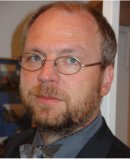|
Plenary
Lecture
Emotional Disease Acceptance in Patients with Depressive
Disorders and Addictions - Results of a Longitudinal
Study with the ERDA Questionnaire

Professor Arndt Bussing
Chair of Medical Theory and Complementary Medicine
University Witten/Herdecke
Gerhard-Kienle-Weg 4, D-58313 Herdecke
E-mail:
Arndt.Buessing@uni-wh.de
Abstract: Background: In
the treatment of patients with
depressive disorders and
associated addictions, the
cognitive disease acceptance is in
most cases the primary focus of
therapeutic interventions.
According to the concept of the
Oberberg Clinics, private
specialist emergency clinics which
offer comprehensive medical and
psychotherapeutic treatment for
individuals suffering from
emotional, psychosomatic and
psychiatric problems, an emotional
acceptance is of outstanding
relevance for the long-term course
of disease. Thus, we have
developed an instrument to
identify the levels and factors of
acceptance, the "Emotional /
Rational Disease Acceptance" (ERDA)
questionnaire (Bussing et al.,
Health and Quality of Life
Outcomes, 2008). In a multicenter
prospective cohort study, we
investigated how the weighting of
the respective disease acceptance
styles may change during the
therapeutic intervention.
Methods: We consecutively enrolled
225 patients treated in the
Oberberg Clinics Schwarzwald,
Weserbergland and
Berlin/Brandenburg: 39% were
women; 60% men; mean age 50 +- 9
years; 45% depressive, 44%
addictive, 9% anxiety, and 3%
other psychiatric disorders. At
the start and at the end of their
hospital treatment, we anonymously
applied the ERDA questionnaire,
Beck/s Depression Inventory (BDI),
SCL-90-R symptom checklist, Escape
from Illness (AKU), and the Brief
Multidimensional Life Satisfaction
Scale (BMLSS).
Results: Reliability analysis of
the 21-item ERDA questionnaire
(Version 2) revealed a good
internal consistency (Cronbach/s
alpha = 0.88). Exploratory factor
analysis revealed 5 factors which
explain 63% of variance: Positive
Life Construction, Contentedness,
Well-being (emotional, ePLC);
Rejection Irrational Dealing will
Illness (emotional, eRIDI);
Rejection of Guild / Failure
(emotional, eRGF), Understanding
Causes of Illness (rational, rUCI);
Rational Disease Acceptance (RDA).
eRIDI and RDA were strongly
inter-correlated (r=0.55). ePLC
correlated strongly with
depression (BDI, r=-0.60;
SCL-90-R/s Global Severity Index,
r= -0.57), and life satisfaction (BMLSS,
r=0.57). Escape correlated
strongly with eRIDI (r= -0.62),
and moderately with ePLC, eRGF and
RDA (r > -0.50). BDI and SCL-90-R
correlated moderately with eRIDI
and eRGF (r> -0.39), and weakly
with rUCD and RDA (r> -0.29). Life
satisfaction correlated moderately
with eRIDI and eRGF (r<0.35), and
weakly with RDA (r=0.22), but not
with rUCI (r=0.08)
During the hospital stay, both the
ERDA and life satisfaction scores
of the patients significantly
increased, while BDI scores,
Global Severity Index of the
SCL-90-R and Escape significantly
decreased. In patients with
addictive, depressive and anxiety
disorders, the treatment resulted
in strong effects particularly
with respect to ePLC (Cohen/s d =
0.95-1.18), strong effect sizes
with respect to RDA in patients
with depression and anxiety
(0.85-1.55), moderate effect sizes
in eRIDI and rUCI (0.53-0.80), and
small effect sizes for eRGF
particularly in patients with
addictions (Cohen/s d = 0.34). The
intervention resulted in strong
effect sizes with respect to
psychiatric symptoms (BDI,
SCL-90-R: 0.83-1.82).
Conclusion: We were able to
confirm the ERDA as a reliable and
valid instrument which was
sensitive to psychotherapeutic
treatment effects. Because
rational disease acceptance was
highly expressed even at the start
of treatment, particularly in
patients with addictive and
depressive disorders, this
variable should not be regarded as
a relevant marker of patients at
risk.
Brief Biography of the Speaker:
Studied medicine at the Technical
University Aachen from 1984-1991,
worked at the Institute of
Immunology of Technical University
Aachen from 1992-1995, and became
head of the Department of Applied
Immunology, Krebsforschung
Herdecke from 1995-2005. In 2002,
he received his venia legendi at
the University of Witten/Herdecke.
Since 2005 he is senior researcher
at the Chair of Medical Theory and
Complementary Medicine of
University Witten Herdecke, and
became a full research professor
in 2007. Arndt Bussing is editor
of the German Journal of Oncology
since 2004, and advisory board of
the journal Research in
Complementary Medicine since 2006.
|
